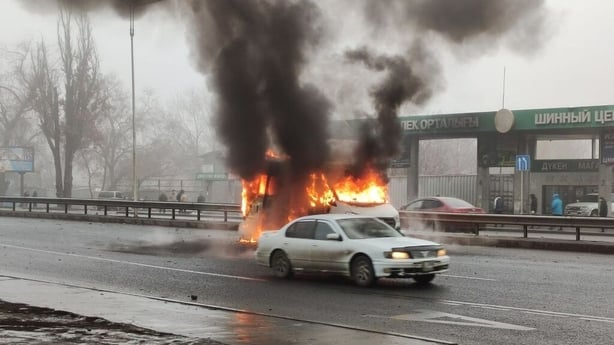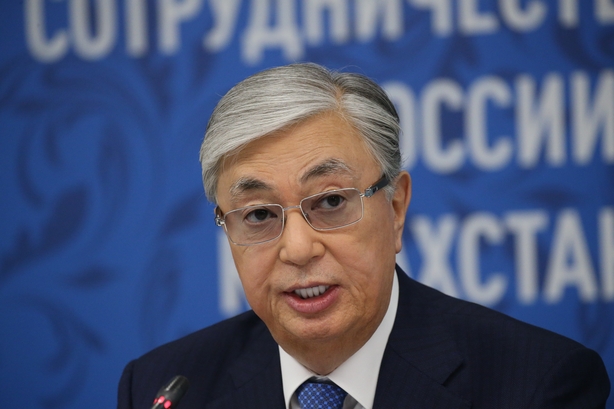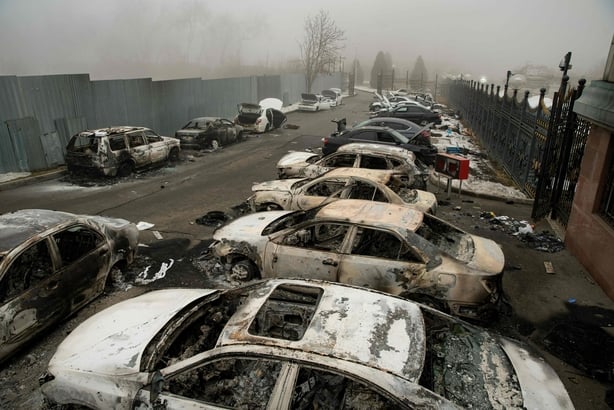Security forces appeared to have reclaimed the streets of Kazakhstan's main city after days of violence, as the Russian-backed president said he had ordered his troops to shoot to kill to end a countrywide uprising.
President Kassym-Jomart Tokayev has said there would be no negotiations with protesters, vowing to destroy "armed bandits" who had attacked the country.
A day after Russia sent paratroopers to help crush the insurrection, police were patrolling the debris-strewn streets of Almaty, although some gunfire could still be heard.
Dozens have died and public buildings across Kazakhstan have been ransacked and torched in the worst violence in its 30 years of independence.
President Tokayev said foreign-trained terrorists were responsible for the unrest.
"The militants have not laid down their arms, they continue to commit crimes or are preparing for them," he said in a televised address.
"Whoever does not surrender will be destroyed. I have given the order to law enforcement agencies and the army to shoot to kill, without warning."
He said Almaty had been attacked by "20,000 bandits" and gave "special thanks" to Russian President Vladimir Putin for sending troops to help quell the unrest.
"Calls are being made abroad for the parties to negotiate a peaceful solution. What nonsense. What kind of negotiations can there be with criminals, with murderers? We are dealing with armed and trained bandits... so they must be destroyed. This will be done shortly," Mr Tokayev said.
Demonstrations that began as a response to a fuel price hike have swelled into a broad movement against the government and ex-leader Nursultan Nazarbayev, the longest-serving ruler of any former Soviet state.
He turned over the presidency to Mr Tokayev three years ago but his family is widely believed to have retained influence in Nur-Sultan, the purpose-built capital that bears his name.
Security forces appear to be in control of the streets of Almaty as the president said constitutional order had mostly been restored.

Russia's defence ministry, cited by Interfax, said more than 70 planes were flying round the clock to bring Russian troops into Kazakhstan, and they were now helping control Almaty's main airport, recaptured yesterday from protesters.
Mr Tokayev, Mr Nazarbayev's hand-picked successor, called in Russian paratroopers yesterday as part of a force from former Soviet states to help put down the uprising, which he has described as a revolt by foreign-trained militants.

"An anti-terrorist operation has been launched. The forces of law and order are working hard. Constitutional order has largely been restored in all regions of the country," Mr Tokayev said in a statement.
"Local authorities are in control of the situation. But terrorists are still using weapons and damaging the property of citizens. Therefore, counter-terrorist actions should be continued until the militants are completely eliminated."
Troops in Almaty
The interior ministry said 26 "armed criminals" had been "liquidated" and more than 3,700 detained, while 18 police and national guard service members had been killed since the start of the protests.
This morning, Reuters correspondents saw armoured personal carriers and troops in the main square of Almaty.
In another part of the city, an ammunition shop had been ransacked. Military vehicles and about 100 people in military uniforms had also taken positions at another square in Almaty.
Widespread unrest has been reported in a number of other cities across the vast country of 19 million people.

The internet has been shut off since Wednesday, making it difficult to determine the full extent of the violence.
The protesters in Almaty appear mainly to come from thecity's poor outskirts or surrounding towns and villages.
The violence has come as a shock to urban Kazakhs, used to comparing their country favourably to more repressive and volatile ex-Soviet Central Asian neighbours.
In a state where scant political opposition is tolerated, no high-profile leaders of the protest movement have emerged to issue any formal demands.
However Mukhtar Ablyazov, a former banker and government minister who is leader of an opposition movement called Democratic Choice of Kazakhstan, said the West needed to enter the fray.
"If not, then Kazakhstan will turn into Belarus and (RussianPresident Vladimir) Putin will methodically impose his programme - the recreation of a structure like the Soviet Union," Mr Ablyazov told from Paris.
"The West should tear Kazakhstan away from Russia. Russia has already entered, sent in troops. CSTO is Russia. This is an occupation by Russia," he said.
Moscow's swift deployment demonstrated the Kremlin's readiness to use force to maintain its influence in the former Soviet Union.
The Russian-led Collective Security Treaty Organization said its peacekeeping force from former Soviet states would number about 2,500 and would stay in Kazakhstan for a few days or weeks.
Russia was "standing up for Kazakhstan and doing as allies should", Deputy Foreign Minister Alexander Grushko said.
Mr Tokayev's administration said the force was still arriving and had not been engaged in combat or the "elimination of militants".
The violence has been unprecedented in a country ruled firmly for decades by Mr Nazarbayev, who was the last Soviet-era Communist Party boss still in power in an ex-Soviet state when he passed the presidency on to Mr Tokayev in 2019.
Mr Nazarbayev has not been seen or heard from since the protests began.
Mr Tokayev has sought to distance himself from his predecessor, removing Mr Nazarbayev and his nephew from security posts since the protests began.
Mr Tokayev's administration said the identity of the detained militants was being established, and the possibility of them belonging to an extremist organisation was being investigated.
Kazakhstan is a major oil producer and the world's top producer of uranium.
Oil output at its top field, Tengiz, was reduced yesterday, the field's operator Chevron said, as some contractors disrupted train lines in support of the protests.
Global oil prices have risen and the price of uranium has jumped sharply since the clashes began.
The country also accounts for close to a fifth of global Bitcoin "mining", the electricity-intensive process of recording cryptocurrency transactions, and Kazakhstan's internet shutdown has curtailed the computing power of bitcoin's global network.
